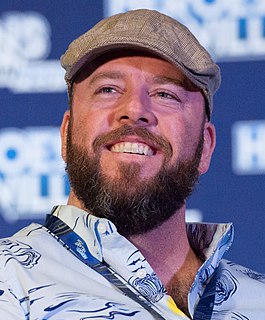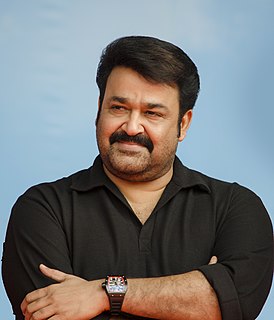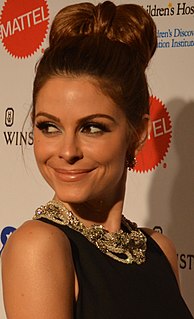A Quote by Peter Vack
What's nice about writing and making films is that being able to see a film from the outside - from the inception through production and then completion - just informs what you're doing when you're an actor. And when you're an actor, it informs the decisions you make when you're making a film. It's using two different sides of your personality.
Related Quotes
Most people assume because I'm an actor that's all I know about and care about, I'm actually a camera geek and a film geek. I grew up making short films the same time I was acting. For me, it's a motion picture, not a play. I'm just as interested in what the camera department is doing and world building through costume design and production design as I am in acting. I think all good directors do that whether they're an actor or not.
Priyadarshan has directed over 84 films and more than 150 ad films. With every film, he is growing. He knows his job well; he is thorough. His way of making a film and song or choreographing a scene is entirely different from other directors. He knows how to use an actor's talent and how to handle an actor.
See, the first thing about actors is, you're just trying to get a job; and you audition and audition and you finally get them. And you still consider yourself an auditioning actor. I auditioned for One Fine Day, I wasn't offered that. So you're still in that 'Hey, I'm just trying to get a job' thing. Then, you get to the point where, if you decide to do it, then they'll make the film. That's a different kind of responsibility, and it usually takes a couple of films to catch up. And then you have to actually pay attention to the kind of films that you're making.
As an actor, you want to be able to move your character forward into new ground, but also it's really interesting to go backwards and unpeel those layers and the interesting elements of what your character is and what informs the decisions that you make so that you can have as much meat to work with.
Being an actor in TV or movies is different. A film or TV actor, if put in theatre, won't know certain dimensions, while a theatre actor won't know certain things when he comes before the camera. So I think a film actor can learn emoting from this theatre counterpart, while the theatre actor can learn about camera techniques from the film actor.
I'm a cinephile. I love movies, I love film at every level. I'm a student of it. It informs me as does all art in my music, because there's stories, there's acts, there's moods, there's dynamics, there's moodiness, emotion. All of those things that play into a film. I think that could equally be said about music. It definitely informs me. Beats is stories.
When you're making a film, you don't really have time to consider what the whole of your film is. And then, when you're releasing your film and promoting your film, you're looking at it in a different way. Then, as you move away from it, you start to look at it objectively and think, 'What could I have done better?'
If you go into a forest of film stories, you never can get right through the forest straight ahead; you always have to make some U-turns or whatever, because there's some trees in the way. And that's what I'm doing. Sometimes, as an actor, if you make only these intellectual, wonderful films, which I love, from time to time you have to make a film like Armageddon so people see that you're still around.

































